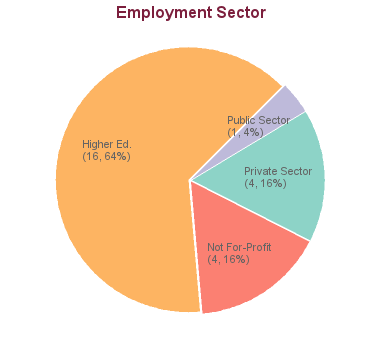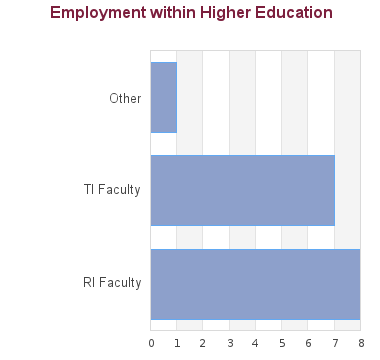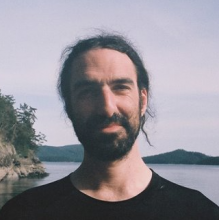Doctor of Philosophy in Sociology (PhD)
Canadian Immigration Updates
Review details about the recently announced changes to study and work permits that apply to master’s and doctoral degree students. Read more
Overview
UBC has granted Master of Arts and Doctor of Philosophy degrees in sociology since 1970, although the first sociology course was taught at the university as long ago as 1921. Students in the Ph.D. program in sociology at UBC have the opportunity to specialize in any one or more of the Department's seven major areas of specialization:
- Environment, Community and Social Movements;
- Family and Life Course;
- Gender and Sexuality;
- Health and Healthcare;
- Knowledge, Culture and Power;
- Race, Ethnicity and Immigration; and
- Work, Economy and Globalization.
What makes the program unique?
UBC sociology has a strong tradition of publishing research that matters. A sample of recent and award-winning books include: Gillian Creese's The New African Diaspora (U. Toronto Press); Amin Ghaziani's There Goes the Gayborhood? (Princeton U. Press), Renisa Mawani's Colonial Proximities(UBC Press), Becki Ross Burlesque West: Showgirls, Sex, and Sin in Postwar Vancouver (U. Toronto Press), and Wendy Roth's Race Migrations (Stanford U. Press).
UBC sociology has a strong history of engaging in community and service oriented learning projects, providing students with hands-on learning experiences carrying out research for partnering organizations in and around Vancouver (e.g. RainCity Housing, SPEC, City of Vancouver, Neighborhood House Association, Be The Change). There is a strong co-op tradition, and the Department also runs the Immigrant Vancouver Ethnographic Field School (in conjunction with the Department of Anthropology).
Quick Facts
Program Enquiries
Contact the program
Admission Information & Requirements
1) Check Eligibility
Minimum Academic Requirements
The Faculty of Graduate and Postdoctoral Studies establishes the minimum admission requirements common to all applicants, usually a minimum overall average in the B+ range (76% at UBC). The graduate program that you are applying to may have additional requirements. Please review the specific requirements for applicants with credentials from institutions in:
Each program may set higher academic minimum requirements. Please review the program website carefully to understand the program requirements. Meeting the minimum requirements does not guarantee admission as it is a competitive process.
English Language Test
Applicants from a university outside Canada in which English is not the primary language of instruction must provide results of an English language proficiency examination as part of their application. Tests must have been taken within the last 24 months at the time of submission of your application.
Minimum requirements for the two most common English language proficiency tests to apply to this program are listed below:
TOEFL: Test of English as a Foreign Language - internet-based
Overall score requirement: 100
Reading
25
Writing
25
Speaking
22
Listening
22
IELTS: International English Language Testing System
Overall score requirement: 7.0
Reading
6.5
Writing
6.5
Speaking
6.5
Listening
6.5
Other Test Scores
Some programs require additional test scores such as the Graduate Record Examination (GRE) or the Graduate Management Test (GMAT). The requirements for this program are:
The GRE is not required.
2) Meet Deadlines
3) Prepare Application
Transcripts
All applicants have to submit transcripts from all past post-secondary study. Document submission requirements depend on whether your institution of study is within Canada or outside of Canada.
Letters of Reference
A minimum of three references are required for application to graduate programs at UBC. References should be requested from individuals who are prepared to provide a report on your academic ability and qualifications.
Statement of Interest
Many programs require a statement of interest, sometimes called a "statement of intent", "description of research interests" or something similar.
Supervision
Students in research-based programs usually require a faculty member to function as their thesis supervisor. Please follow the instructions provided by each program whether applicants should contact faculty members.
Instructions regarding thesis supervisor contact for Doctor of Philosophy in Sociology (PhD)
Citizenship Verification
Permanent Residents of Canada must provide a clear photocopy of both sides of the Permanent Resident card.
4) Apply Online
All applicants must complete an online application form and pay the application fee to be considered for admission to UBC.
Tuition & Financial Support
Tuition
| Fees | Canadian Citizen / Permanent Resident / Refugee / Diplomat | International |
|---|---|---|
| Application Fee | $116.25 | $168.25 |
| Tuition * | ||
| Installments per year | 3 | 3 |
| Tuition per installment | $1,875.34 | $3,294.66 |
| Tuition per year (plus annual increase, usually 2%-5%) | $5,626.02 | $9,883.98 |
| Int. Tuition Award (ITA) per year (if eligible) | $3,200.00 (-) | |
| Other Fees and Costs | ||
| Student Fees (yearly) | $1,144.10 (approx.) | |
| Costs of living | Estimate your costs of living with our interactive tool in order to start developing a financial plan for your graduate studies. | |
All fees for the year are subject to adjustment and UBC reserves the right to change any fees without notice at any time, including tuition and student fees. Tuition fees are reviewed annually by the UBC Board of Governors. In recent years, tuition increases have been 2% for continuing domestic students and between 2% and 5% for continuing international students. New students may see higher increases in tuition. Admitted students who defer their admission are subject to the potentially higher tuition fees for incoming students effective at the later program start date. In case of a discrepancy between this webpage and the UBC Calendar, the UBC Calendar entry will be held to be correct.
Financial Support
Applicants to UBC have access to a variety of funding options, including merit-based (i.e. based on your academic performance) and need-based (i.e. based on your financial situation) opportunities.
Program Funding Packages
From September 2024 all full-time students in UBC-Vancouver PhD programs will be provided with a funding package of at least $24,000 for each of the first four years of their PhD. The funding package may consist of any combination of internal or external awards, teaching-related work, research assistantships, and graduate academic assistantships. Please note that many graduate programs provide funding packages that are substantially greater than $24,000 per year. Please check with your prospective graduate program for specific details of the funding provided to its PhD students.
Average Funding
- 13 students received Teaching Assistantships. Average TA funding based on 13 students was $17,458.
- 7 students received Research Assistantships. Average RA funding based on 7 students was $8,761.
- 10 students received Academic Assistantships. Average AA funding based on 10 students was $12,112.
- 17 students received internal awards. Average internal award funding based on 17 students was $20,423.
- 3 students received external awards. Average external award funding based on 3 students was $26,111.
Review methodology
Scholarships & awards (merit-based funding)
All applicants are encouraged to review the awards listing to identify potential opportunities to fund their graduate education. The database lists merit-based scholarships and awards and allows for filtering by various criteria, such as domestic vs. international or degree level.
Graduate Research Assistantships (GRA)
Many professors are able to provide Research Assistantships (GRA) from their research grants to support full-time graduate students studying under their supervision. The duties constitute part of the student's graduate degree requirements. A Graduate Research Assistantship is considered a form of fellowship for a period of graduate study and is therefore not covered by a collective agreement. Stipends vary widely, and are dependent on the field of study and the type of research grant from which the assistantship is being funded.
Graduate Teaching Assistantships (GTA)
Graduate programs may have Teaching Assistantships available for registered full-time graduate students. Full teaching assistantships involve 12 hours work per week in preparation, lecturing, or laboratory instruction although many graduate programs offer partial TA appointments at less than 12 hours per week. Teaching assistantship rates are set by collective bargaining between the University and the Teaching Assistants' Union.
Graduate Academic Assistantships (GAA)
Academic Assistantships are employment opportunities to perform work that is relevant to the university or to an individual faculty member, but not to support the student’s graduate research and thesis. Wages are considered regular earnings and when paid monthly, include vacation pay.
Financial aid (need-based funding)
Canadian and US applicants may qualify for governmental loans to finance their studies. Please review eligibility and types of loans.
All students may be able to access private sector or bank loans.
Foreign government scholarships
Many foreign governments provide support to their citizens in pursuing education abroad. International applicants should check the various governmental resources in their home country, such as the Department of Education, for available scholarships.
Working while studying
The possibility to pursue work to supplement income may depend on the demands the program has on students. It should be carefully weighed if work leads to prolonged program durations or whether work placements can be meaningfully embedded into a program.
International students enrolled as full-time students with a valid study permit can work on campus for unlimited hours and work off-campus for no more than 24 hours a week during academic sessions.
A good starting point to explore student jobs is the UBC Work Learn program or a Co-Op placement.
Tax credits and RRSP withdrawals
Students with taxable income in Canada may be able to claim federal or provincial tax credits.
Canadian residents with RRSP accounts may be able to use the Lifelong Learning Plan (LLP) which allows students to withdraw amounts from their registered retirement savings plan (RRSPs) to finance full-time training or education for themselves or their partner.
Please review Filing taxes in Canada on the student services website for more information.
Cost Estimator
Applicants have access to the cost estimator to develop a financial plan that takes into account various income sources and expenses.
Career Outcomes
27 students graduated between 2005 and 2013. Of these, career information was obtained for 25 alumni (based on research conducted between Feb-May 2016):


RI (Research-Intensive) Faculty: typically tenure-track faculty positions (equivalent of the North American Assistant Professor, Associate Professor, and Professor positions) in PhD-granting institutions
TI (Teaching-Intensive) Faculty: typically full-time faculty positions in colleges or in institutions not granting PhDs, and teaching faculty at PhD-granting institutions
Term Faculty: faculty in term appointments (e.g. sessional lecturers, visiting assistant professors, etc.)
Sample Employers in Higher Education
University of Ottawa (2)Memorial University of Newfoundland
Okanagan College
Western University (Ontario)
Trinity Western University
University of Edinburgh
University of Alberta
Camosun College
University of Washington
University of British Columbia
Sample Employers Outside Higher Education
Faculty Association of Simon Fraser UniversityTransplant Research Foundation of British Columbia
Pivot Legal
EMI Consulting
Environmental Resources Management
Vancouver Coastal Health
Sample Job Titles Outside Higher Education
Director (2)Owner of Berton College
Interim Executive Director
Associate Director
Sexuality Educator
Senior Consultant
Clinician
Founder, Wellness Educator
PhD Career Outcome Survey
You may view the full report on career outcomes of UBC PhD graduates on outcomes.grad.ubc.ca.Disclaimer
These data represent historical employment information and do not guarantee future employment prospects for graduates of this program. They are for informational purposes only. Data were collected through either alumni surveys or internet research.Enrolment, Duration & Other Stats
These statistics show data for the Doctor of Philosophy in Sociology (PhD). Data are separated for each degree program combination. You may view data for other degree options in the respective program profile.
ENROLMENT DATA
| 2023 | 2022 | 2021 | 2020 | 2019 | |
|---|---|---|---|---|---|
| Applications | 64 | 66 | 66 | 46 | 60 |
| Offers | 7 | 8 | 5 | 10 | 8 |
| New Registrations | 3 | 3 | 3 | 7 | 3 |
| Total Enrolment | 30 | 32 | 37 | 36 | 32 |
Completion Rates & Times
Disclaimer
Upcoming Doctoral Exams
Wednesday, 16 April 2025 - 9:00am - Room 200
Research Supervisors
Supervision
Students in research-based programs usually require a faculty member to function as their thesis supervisor. Please follow the instructions provided by each program whether applicants should contact faculty members.
Instructions regarding thesis supervisor contact for Doctor of Philosophy in Sociology (PhD)
Advice and insights from UBC Faculty on reaching out to supervisors
These videos contain some general advice from faculty across UBC on finding and reaching out to a supervisor. They are not program specific.
Doctoral Citations
| Year | Citation |
|---|---|
| 2019 | Dr. Wu investigated whether people are trusting because of how they are raised or if they constantly adjust their trust in response to life experiences. He examined moving from a high to a low trust place and how mothers and fathers play different roles in shaping trust of their children. This research shows that people learn to trust early in life through socialization and that learned trust persists into adulthood. |
| 2019 | Dr. Burnett's research examined how past experiences of people who pay for sexual services in Canada inform their behaviours. His analysis revealed the diversity of this population and their role in shaping safety outcomes. This research will inform health and safety policy changes in the sex industry. |
| 2018 | Dr. Keats-Osborn examined the collaborative work involved in generating works of literary journalism. He clarified how reporters and editors develop conventional procedures by anticipating how their work will be received. His research illustrates important links between the production and consumption of culture. |
| 2018 | Dr. Polonijo studied how income, education, and race-ethnicity shape inequalities in human papillomavirus vaccination. Her research identifies the importance of vaccination policy, mother-daughter communication, and community-focused attitudes for both creating and preventing social inequalities in vaccination among adolescents. |
| 2018 | What does it mean to live in a multicultural society? Dr. Ho examined how participating in ethnic organizations can help individuals integrate into Canada while maintaining their ties to an ancestral country. Her work demonstrates how organizations facilitate individuals' identity development and foster connections to both the ancestral country and Canada. |
| 2018 | Dr. Piggot examined how organizations determine which strategies they should adopt in response to new climate change policies. Her work demonstrates that if the right support structures are in place, organizations can quickly come to terms with new requirements to address climate change. |
| 2017 | Dr. Dengate studied the maternity leave experiences of Canadian mothers. She found that mothers' jobs were central to both the structure of leave and the transition back to paid employment. This knowledge will aid the development of more responsive federal and workplace family policies to support women's engagement in motherhood and career. |
| 2017 | Dr. Ivemark compared how French Antilleans and West Africans assimilate across two generations in the Paris region. His work not only sheds light on what generates different group outcomes, it also advances our understanding of the importance of race, culture and religion in the integration experiences of different parts of France's Black population. |
| 2017 | Dr. Hochbaum explored the extent to which child characteristics determine parental disciplinary behaviours. She showed that mothers respond to increasingly socially competent children by rewarding them more and punishing them less. The findings of her study strongly suggest that child characteristics contribute significantly to parenting behaviour. |
| 2017 | Dr. Kolpashnikova studied the gendered division of housework in Canada, paying special attention to changes over time and to the factors explaining women's and men's differential participation in routine and non-routine housework tasks. This research reveals patterns and processes that could propel societal changes toward greater gender equality. |
Pages
Sample Thesis Submissions
Further Information
Specialization
Sociology has specialization in the following core areas of study:
- Environment, community, and social movements;
- Family and the life course;
- Gender and sexuality;
- Health and healthcare;
- Knowledge, culture, and power;
- Race, ethnicity, and immigration; and
- Work, economy, and globalization.
Program Website
Faculty Overview
Academic Unit
Program Identifier
Classification
Program Enquiries
Contact the program
Departments/Programs may update graduate degree program details through the Faculty & Staff portal. To update contact details for application inquiries, please use this form.

Considering UBC for your graduate studies?
Here, you can choose from more than 300 graduate degree program options and 2000+ research supervisors. You can even design your own program.



